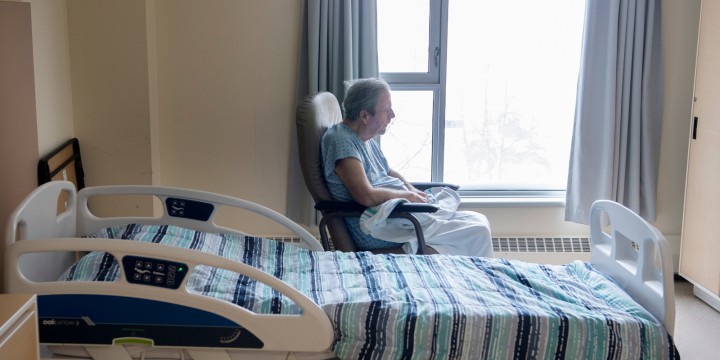
Health care in Canada is a ‘mess’: Journalist André Picard on fixing the system and improving the lives of our elders
Today’s episode of Hub Dialogues features host Sean Speer in conversation with The Globe and Mail’s health care columnist André Picard about his important new book, Neglected No More: The Urgent Need to Improve the Lives of Canada’s Elders in the Wake of a Pandemic.
They discuss how the COVID-19 pandemic exposed many of the faults in Canada’s elder and long-term care practices, the messiness of our Medicare system, what improvements we can make to prioritize better outcomes, and the poor quality of the health care debate in Canada.
You can listen to this episode of Hub Dialogues on Acast, Amazon, Apple, Google, Spotify, or YouTube. A transcript of the episode is available below.
Transcripts of our podcast episodes are not fully edited for grammar or spelling.
SEAN SPEER: Welcome to Hub Dialogues. I’m your host Sean Speer, editor-at-large at The Hub. I’m honoured to be joined today by André Picard, a health care reporter and columnist for The Globe and Mail and author of the important new book, Neglected No More: The Urgent Need to Improve the Lives of Canada’s Elders in the Wake of a Pandemic. Neglected No More has been shortlisted for the prestigious Donner Prize for the best public policy book by a Canadian. The prize will be awarded on May 31st. André, thank you for joining us at Hub Dialogues, and congratulations on the book and its success.
ANDRÉ PICARD: Thanks. It’s a pleasure to be here.
SEAN SPEER: Let me start with something of a biographical question. How did you come to the health care beat? And how, if at all, has the debate about health policy changed over your career?
ANDRÉ PICARD: Well, I came to the health beat a long time ago, by accident. I started in student journalism in the era where AIDS emerged and got interested in that—as student journalists we were very activist and got interested in that issue. And when I went to, a few years later, to The Globe and Mail, it was the time when AIDS was entering the mainstream media. So, that’s kind of been the arc of my career, this worst pandemic in the history of humanity, AIDS, far more deadly than COVID we have to remember, and I went from there.
SEAN SPEER: The health care debate tends to be marked by strong feelings that at times can come to stand in the way of potential reform. One thing that I admire about your writing is its dispassion and focus on evidence, including, for instance, the narrowness of Canada’s public insurance model. How do you see your role in these debates? And how can we create a constituency for sensible health care reform?
ANDRÉ PICARD: You know, I see myself writing about health policy; I don’t really write about medicine. I write about the policy and the politics of health, which is really I think essential. I don’t think people recognize the importance of policy in their daily lives, how it affects how they get care and don’t get care. So, to me, it’s all about that. It’s about what does this mean to the public? How do systems matter to people? So, I’m kind of obsessed with systems, about administration, things that people don’t really pay attention to even though they’re really important.
As for the dispassion part, I think that’s how you have to approach these stories. You have to step back and not get caught up in the mythology—I think there’s a lot of mythology about Medicare—don’t get caught up in the partisanship, or all private is bad, all public is good. There’s a lot of nuance in health as there are in many policy issues. So, I try and approach it in that real, practical, pragmatic sense of, “Is this good? Is it working? If not, why is it not working?”
SEAN SPEER: One final, big picture question, André, before we turn to the book. One of the inherent policy challenges with the health care file is the intergenerational dynamic. That is to say, health care consumption is driven disproportionately by old people. And so, as the population ages, more and more scarce public dollars will be consumed by seniors in the health care system.
Are you concerned at all about the issues of intergenerational equity and the possibility for intergenerational friction in Canada? How can we minimize those risks?
ANDRÉ PICARD: I think the reality is as we get older, we need more health care. That’s always been the case, it will always be the case, probably. So, I think we have to put it in that context. I don’t think young people should be alarmed that older people consume more health resources. That’s how insurance works. You pay into it your whole life, and then you cash in when you need it. So, I always put it in those terms. It’s like, think of your house insurance. That’s a little less political. You hope that you never need it. But if your house burns down, then you have that insurance.
That’s how we should think about public health. Ideally, no one should ever want to use their health insurance. But a lot of us are going to. But we’re going to do it at the end of life when our house is burning down. So, I think if you think of it in those terms, young people should be saying, “Yeah, I’m investing in my future as well. It’s not just about my grandmother or my mother. It’s about I’m going to want this care someday too.”
SEAN SPEER: So, that’s a good segue to your book. You were sounding the alarm bells about Canada’s system of long-term care homes and residential facilities as early in the pandemic as March 8th, 2020. What did you see that others did not? Why had we permitted long-term care to get to a place where it would ultimately be home to 62 percent of COVID deaths a little more than a year later?
ANDRÉ PICARD: I think the advantage I have is just the context that I’ve been doing this for a long time. I know that long-term care homes are kind of like cruise ships. Early in the pandemic, we wrote about cruise ships and all the outbreaks and I remember writing, “Well, the long-term care home is a cruise ship without the fancy buffets and the shuffleboard.” Although some of the homes do have shuffleboard.
But the reality is we put people in this ideal environment for the spread of illness, and that’s been the case. Every year, thousands of people die in long-term care homes. Much smaller numbers than during the pandemic, but that’s a reality we’ve just accepted. And I’ve for a long time said we should challenge this acceptance of death happening on this scale.
SEAN SPEER: I was struck to learn that, notwithstanding the North American ethos of individualism and civil society, we institutionalize more of our elderly population than more communitarian or socialistic countries in Europe. What has led to this preference for institutionalization over home-based care?
ANDRÉ PICARD: I often say Canada’s a prisoner of its history in health care, and this is a really good example. We just do things because we’ve always done them that way. It’s true of Medicare, and, more generally, why do we fund 100 percent of hospital and physician care and we don’t fund other things? Because that’s the way we did in the 1950s when it made sense. Today, it doesn’t. So, it’s the same in long-term care, that the long-term care system we have has actually nothing to do with health care; its origins are in penal care.
That’s why to this day our nursing homes look like jails, they feel like jails because that’s what they were. They were a place to put the indigent and make them work for their gruel quite literally. You know, if you had no money, the state would take care of you grudgingly, but you had to work for it. And this was a system that existed in Canada into my lifetime. This actually existed into the 1960s, where we had people in long-term care in uniforms, they had assigned chores, etc. And these were pretty grim facilities, and they’ve gotten better, but they’ve not gotten near better enough.
SEAN SPEER: One of your critiques of the model is that care workers are often in part-time, low-salary positions. Yet economic theory would suggest that the gap between supply and demand ought to push up wages as care providers compete for scarce labour. Why isn’t that happening, André? What do you think is behind it?
ANDRÉ PICARD: Well, I’m not an economist, but I think a lot of it just has to do with the conditions of work. This is not a place that people want to work, so it doesn’t matter how much scarce labour there is. It’s always going to be the marginal in society that are caring for another group of the marginalized, unfortunately. The reality too is that we’ve always depended in these homes on immigrants and refugees, people who have trouble getting work elsewhere. So, that’s allowed employers to keep wages down. The health care sector is not a free-market model. You have to have a certain kinds of training, you have to have a willingness to do this work, this backbreaking work, that a lot of people don’t want to do; they do it reluctantly. So, I think there are all kinds of economic factors.
I’m not an economist, but I think just practically, these are jobs that people take as a last resort. You know, I talked to many health care and personal support workers who aspired to a job at McDonald’s, but they couldn’t speak English quite well enough to do that. You know, that shouldn’t be the situation. People caring for our loved ones, in their most intimate moments, should be highly trained people. They should be people who want to do this, and that’s not the case. And I quote in the book a famous sociologist, Pat Armstrong, who says, “The conditions of work are the conditions of care.” And that’s the reality. We treat these workers terribly, and that’s why we get terrible care.
SEAN SPEER: You mentioned earlier, André, the extent to which the system is a function of our history. The long-term care system is like much of our health care model, a hybrid between public and private. These arrangements have built up over many years, just as they have for say, pharmaceuticals. Well, one might not design the system this way if he or she was starting from scratch, there’s some need to confront the system as it is.
With that in mind, how can policymakers start to reform it within these legacy structures and arrangements?
ANDRÉ PICARD: I think reform has to start with pretty fundamental stuff. It has to start with our values, with our philosophy. I think we, the countries that provide good elder care, have a very simple philosophy. They say that elders matter to us, we want to keep them in the community as long as possible, and then we structure the system. Based on that philosophy, Canada doesn’t do that. Canada says, “We’ve always had these homes, so our reflex is we’re going to put people in them,” rather than making changes, rather than supporting homecare, community housing, all these alternatives are what we do really, really poorly in Canada. So, I think we have to work on putting our values into practice. That is a big thing.
A lot of people say, “You know, there’s so much to do, is it fixable?” And I think it is, it’s fixable because we have a lot of examples of good care in Canada, and what we have to do is scale up our successes and stop repeating our failures. Our system is built on a model of failure. So, we just kind of keep plugging away at it rather than embracing these outliers of people who do it much better.
SEAN SPEER: One of the challenges I think facing some Medicare proponents is the degree of need across the health care system. So, for instance, there are some who’ve argued that in a zero-sum world, we ought to be prioritizing bringing pharmaceuticals within the single-payer model over say changes to long-term care.
How should policymakers think about the various demands on the system and demands on public finances when determining kind of where best to spend the next dollar, so to speak?
ANDRÉ PICARD: Yes, I think that to me that’s the big unresolved policy question in Canadian health care. Should we pay for everything for everyone? And I think that one of the few things we can all agree on across the political spectrum is no, we can’t pay for every little bit of care for every person. So, then the question becomes, and I think this is the great unanswered question in Canada is, well what should Medicare cover? And we don’t ever have that debate. We just kind of poke away at the fringes. I don’t believe we should pay for 100 percent of hospital and physician care. That doesn’t make sense to me; it’s not all essential. But I know that some home care is essential. I know some long-term care is essential. So, let’s set some parameters. And it’s not going to be easy. But again, many countries have done it.
I don’t think people have a problem paying for health care out of pocket or with private insurance. What they don’t like is not knowing what the rules are, and the rules are all over the map. They make no sense. They’re not fair. They vary from jurisdiction to jurisdiction, sometimes from institution to institution. So, we need some clarity in what’s covered and what isn’t. And I’d love to have that big, messy debate in Canada. I think it’s long overdue. We just have to stop with this rhetorical all private is bad, because it isn’t. Sometimes it’s bad but still necessary. You know, there’s a spectrum there of stuff that we have to address and the reality, and you know this, is that Canada has a lot more private spending than many countries, but we just have not necessarily in the right places. So, we have to figure that out.
SEAN SPEER: I’d like to just come back to the long-term care topic. As you know, the federal government has signalled its intention to, in effect, provide funding to the provinces in exchange for something of a national framework around long-term care.
Do you think that’s a good idea? And what principles do you think ought to be reflected in some kind of federal-provincial long-term care agreement?
ANDRÉ PICARD: I think the question comes down to a fundamental one, what’s the role of the federal government in health care? And I think the role is to provide some funding because they have a better tax base. But I think it’s to provide funding in a way that brings about a semblance of a national system. We’re never going to have a national health care system in Canada because of our Constitution. But we can create some equity and some fairness from coast to coast, and you do that by using federal money smartly. So, in long-term care, what can they do? I think they can do what they’ve promised to do, which is say, “We’re going to fund the implementation of standards of care.”
So, for example, a standard could be every person in a long-term care home will get four hours daily of hands-on care, and the government can provide, I think it’s $3 billion they’ve allocated to that, and that’ll go a little way towards doing that. But if you have that same standard across Canada, that’s the kind of thing we need, and then the provinces still have their freedom. So, I think Ottawa could do a lot, but I don’t think it’s done near enough in this sector. Recently, there’s a new announcement of a $30 billion program for daycare in Canada. I think that’s a good program. That’s economically sound, and it’s a way of getting women to remain in the workforce.
But my response to that was, well, why don’t we do the same thing for elders? There are actually more women caring for older adults than there are caring for children in this country. And the same economic arguments apply. They leave their jobs early, they endanger their pensions, they get burned out, and they do all this because they don’t have adequate support. So, why not adult daycare? Or why not more subsidized long-term care in a more coherent fashion? So, I think we, if we’re going to make these economic arguments, we have to make them across the spectrum. It’s great that we take care of kids, and we should, but we should also take care of our elders who have done their time, who have paid their taxes for fifty and sixty years. We owe them something as well.
SEAN SPEER: In the book, and in more recent commentary, André, you’ve pointed to Quebec as a province where there seem to be some promising developments on this file. I’ll maybe just ask you to elaborate a bit on why you think Quebec may represent something of a model that other provinces can replicate in Canada?
ANDRÉ PICARD: You know, I think there are promising models all over the place. So, Quebec has vowed to do something called the Maison des aînés, so elder homes. So, they’ve kind of looked at what I and many other critics have said, which is that we need smaller, more home-like facilities. You know, I don’t ever say we don’t need long-term care. We do, but it has to be different. It has to be like a home where people feel comfortable, where they want to go, not where they fear going. Where they have some autonomy, where the staff doesn’t necessarily wear uniforms, like prison guards, you know, where it looks like a home. So, Quebec, I think, has embraced that model. So, I think that’s a good example.
And another one is it’s not Quebec, but Veterans Affairs. The people who have the best eldercare in Canada are veterans, and why? Because we’ve had a program for them for many years. They get little more funding, they get support to stay at home longer. When they are in facilities, those facilities are much more autonomous. People wake up when they want, they eat when they want, it’s treated like a home. It’s not treated like a prison: you have to eat breakfast at 7 am, and we’re going to bring you there at six because you’re in a wheelchair and we have other people to get. It’s not a good life in most long-term care homes. So, I looked at the models where people treat residents with more dignity and with more autonomy as the model, whether it’s Quebec or Veterans Affairs, or any number of examples.
SEAN SPEER: Do you have any thoughts, André, on models in Canada or elsewhere, whereby public policy would help elders remain in their own homes or possibly the homes of family members longer as opposed to moving in the direction of an institutionalized model?
ANDRÉ PICARD: Oh, there are many models like that around the world. Canada is really the outlier. We spend inefficiently and ineffectively by institutionalizing a lot more people. It’s much more expensive than say homecare. Denmark’s often held up as the gold standard. If you’re in a country like Denmark, you really only go to long-term care as a last resort. If you need 24/7 care, you have advanced dementia and you wander, that’s how you end up in a home there, and it’s a small, tiny home where you’re safe. In Denmark, you can get up to 10 hours a day of homecare. You can get six visits, so you can get all your meals, some bathing, make sure you’re safe in between.
In Canada, in most of Canada, we cap homecare at three hours a day for three months. That’s not going to allow someone to live with a chronic condition. They’re going to end up in an institution by default. Other countries have respite care, you know, you just need a break. Caregivers do a lot. They do most of the work, but sometimes they just need a break. Why do people end up in homes in Canada often? Because their caregivers are just burned out, they can’t take it anymore. So, give them a little bit of a break. I mentioned before adult daycare, dementia daycare, and programs like that are really important.
Supportive Housing. The number one reason people leave for long-term care is little banal things: I can’t shovel my walk anymore; I have a few steps in front of my house. These things are fixable. You don’t have to put someone shoved away in an institution when you can get some of the neighbours to shovel their walk and maybe even pay them, or you can take out the stairs and put in an on-ramp. All these little things. That’s what’s frustrating, is so many people get institutionalized for ridiculous reasons.
SEAN SPEER: If I can now come back, André, to the messy debate that you alluded to earlier. It’s not often we have one of the leading health care policy commentators in the country on our podcast.
So, I just have to ask you, if you were king for a day, what would you do with Canada’s outdated health care model? Is there something of a potential left-right compromise that involves the expansion of public insurance for presently non-insured services in exchange for greater market reforms in the area of surgeries, and possibly even means-tested co-payments?
ANDRÉ PICARD: Yeah, I think to me the key to this is what I said earlier, is let’s just do what’s in and what’s out. I like to use the analogy of a basket, the Medicare basket of services. And right now we have this very narrow, very deep basket that covers 100 percent of hospital and physician care. And I would like us to have more of a European model, which is a much broader basket that covers everything from dental care to long-term care, and everything in between for those who need it, and that basket be a little shallower. So, some people will have to pay for private or most people would have to pay for private insurance or some out of pocket. But the key there is clarity. We’re never going to pay 100 percent of everything for everyone. So, let’s be clear on where we draw the lines.
These are going to be these moving targets. We see that in European countries, these debates are ongoing, but it’s a much more fair model when there’s transparency, and when there’s understanding of that we have to contribute, which we do now, but we don’t contribute in a logical way with our private insurance. One of the worst things about Canadian health care is we have the highest out-of-pocket costs in the world. In European countries, people don’t pay out of pocket because there’s a clarity: here’s what you need private insurance for, and here’s what you need public insurance for, and there’s no messiness; there’s no surprises.
SEAN SPEER: I’m always struck, André, that when we talk about our single-payer model, there’s a presumption in some circles that it extends across the system. And yet, I think today hospital and physician services represent something less than 50 percent of total health care expenditures. So, in other words, we have a single-payer model for something like 40-45 percent of the system. And then, as you say, this kind of hybrid model that’s evolved over time for the other 50 or even 55 percent. Bringing some rationalization to the way in which we think about those two halves of the system makes a great deal of sense.
One obstacle to reform has always been that these issues are perceived as something of a political third rail. As someone who spent a lot of time thinking and talking about health care, what do you think about that working political hypothesis? Is the public more open and ready for reform than policymakers give them credit?
ANDRÉ PICARD: I think the public is a bit frightened because that’s what we do. We’re frightened, you know, if we say, “You can have our system now, which is clunky, or you can have that horrible American system.” So, we set up this false dichotomy, which I don’t think is true. So, I say why can’t we have a system like Denmark or the Netherlands? But I don’t believe you can just import something whole hog. We have to adapt to our reality, and our reality is that I don’t use the term single-payer, I don’t use the term two-tier because I think those expressions are meaningless because they’re not true. We have a system that’s really a mess in Canada, it’s multitiered.
Some stuff is covered 100 percent physician care and hospitals, and many other things or, you know, dental care is about 6 percent public funding. Why is that? Is the mouth not part of the body? And let’s figure that stuff out. Why do we cover 40 percent of homecare, 50 percent of prescription drugs? There’s no rhyme or reason to this, and we have to have that discussion. So, I think across the board, there’s agreement on this.
I think where we lack the agreement is how to fix it. And, yeah, the fear of the public is a big thing, but we have to address that. I think we have to do a better job of telling people there are other alternatives to the U.S. versus Canada dichotomy. There are a lot of things, a lot of places out there that work really well, that have less private care than us, but they do it in a more smart way, they spend their public dollars a little more wisely, as well.
SEAN SPEER: Well, André, as we have that debate in our society, Canadians will be well served by reading Neglected No More: The Urgent Need to Improve the Lives of Canada’s Elders in the Wake of a Pandemic, which as I said in the introduction, is been shortlisted for the prestigious Donner Prize, which will be awarded on May 31st. Good luck, and thank you so much for taking the time to speak with us at Hub Dialogues.
ANDRÉ PICARD: Thank you, I enjoyed the chat.
Other Popular
Audio Content

‘A delicate balance’: Why the Conservative convention is a crossroads for the party

‘The mainstream media forfeited so much trust’: Former New York Times editor on how activism kills journalism


